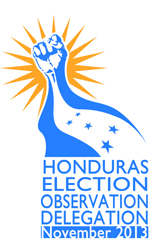Executive Summary
As members of the North American Honduras Solidarity Network (HSN), the US-based organizations Alliance for Global Justice (AFGJ) and Task Force on the Americas (TFA) recently sent a delegation of 55 human rights accompaniers and election monitors to Honduras from November 17 to November 26, 2013. The delegation’s mission was to observe and document conditions on the ground in advance of and during the country’s national elections, which took place on November 24, 2013. Both organizations have a long track record of human rights advocacy and solidarity with Honduran civil society. AFGJ/TFA delegates were granted credentials by the Supreme Electoral Tribunal of Honduras (TSE by its Spanish acronym) to participate in the elections as official “International Observers and Accompaniers.” This report documents the delegation’s observations.
In the week prior to election day, 35 AFGJ/TFA delegates visited eight communities in four northwestern departments (Cortés, Intibucá, Atlántida and Yoro) to meet with local people and document their struggles, challenges and hopes for a democratic Honduras. The communities we visited are characterized by ongoing conflicts concerning land, territory and natural resources as well as documented violations of human rights. While the following report focuses primarily on describing in exhaustive detail our election day observations, a brief summary of pre-election day observations is also included. We strongly believe that the broader context of conflict, repression and violence experienced by the country’s most vulnerable people—namely peasants (campesinos), low-wage workers, youth, indigenous and Garifuna peoples—must be taken into account when evaluating the effectiveness of Honduras’ (or any) democratic process. Indeed, we have observed that these precarious conditions are frequently used as a form of control—for example, threatening to revoke people’s meager public benefits if they fail to support the governing party, a story we heard on multiple occasions in different regions.
On election day, November 24, 2013, a total of 55 AFGJ/TFA delegates visited 49 voting centers in 5 departments of northwest Honduras—Cortés, Lempira, Santa Barbara, Copán and Ocotepeque (see map on following page). While observers were touched by the commitment, courage and enthusiasm of the many Hondurans who participated in this process in good faith, we were also saddened by the numerous discrepancies, lack of preparedness and resources, bribery, voter intimidation, violence and outright fraud, which we witnessed throughout the day. While not all of these events occurred at all polling sites, the observations contained herein demonstrate a clear pattern of systematic undermining of the people’s right to a free and fair election. This pattern includes:
- Instances of vote buying by “party activists” (generally paid by a party to campaign at polling locations) and even by candidates themselves. In one case, in Quimistan, department of Santa Barbara, a congressional candidate was observed handing out 100-lempira bills to people outside the voting center.
- Voter intimidation by throngs of aggressive activists or by candidates. In the village of El Cocotillo in the municipality of Lepaera, Lempira, the mayor himself sat inside the voting area, directly in front of the ballot box as people cast their votes.
- Complaints by voters that they were unable to vote, either because they were listed as “deceased,” their polling station was changed at the last minute,or their name was simply not listed in the registry.
- Over-representation of National Party on electoral tables (MERs), which are supposed to have a maximum of two members from each party represented. In every department where observers were present, we took testimony from people claiming that well-known National Party members were brandishing credentials of other parties at the MERs—generally smaller parties that received few, and in many cases zero, votes.
- Instances of violent attacks against electoral table workers so that they were unable to represent their party and perform their duties operating the MER. In one case in Paraíso, Copán, a van containing eleven MER members affiliated with the LIBRE party was stopped at 2:00am on election day, its tires slashed, the representatives prevented from fulfilling their duties, and violently threatened.
- Instances of bribery and coercion, particularly by the governing National Party. In Santa Barbara, observers took testimony that the National Party was handing out discount cards and free cell phone credit, as well as threatening that people would lose their bonos (public assistance funds) if they failed to vote todo azul (“all in blue,” the color of the National Party).
These events were not isolated incidents, but rather came up repeatedly in different communities of the five departments where observers were present, indicating a widespread and systematic assault on the democratic process. And the incidents witnessed on election day must be understood in relationship to a broader context of deepening structural violence since the June 2009 military coup. Honduras has not yet healed from this trauma. Indeed, over the last four and a half years, the country has experienced staggering rates of politically motivated violence, land grabbing, narco-trafficking, militarization, unemployment and inequality. Nonetheless, we are hopeful that democracy can and will flourish in Honduras through the efforts of the countless women and men working to strengthen their communities and promote civic engagement throughout the country.
As North Americans—many of whom have visited Honduras more than once as human rights observers—we have been inspired time and time again by Hondurans working for peace and justice, and learned many valuable lessons to bring back to our own communities. Unfortunately, the electoral process we witnessed on November 24 did not reflect the integrity and dignity of the Honduran people. We hope that the information contained in this report serves to pierce the pervasive rhetoric claiming Honduras’ November 24 election was “peaceful” and “transparent.” These hollow pronouncements began ringing out early on election day, before accredited election observers were legally permitted to comment publicly on the day’s events—as per the agreement we signed with the Supreme Electoral Tribunal. We present this report in the interest of genuine transparency, peace and democracy in Honduras.

 EXECUTIVE SUMMARY PDF
EXECUTIVE SUMMARY PDF